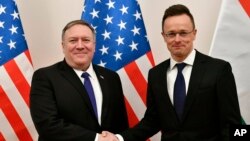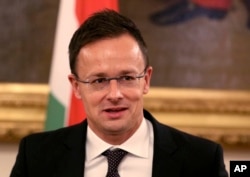On the sidelines of two days of events marking the 70th anniversary of the founding of the North Atlantic Treaty Organization (NATO), the United States signed a bilateral defense cooperation agreement with Hungary, an act that went almost unnoticed by American media.
Hungarian media, however, widely published the news Saturday, quoting Hungary's Minister of Foreign Affairs and Trade, Peter Szijjarto, as saying this is a "modernized version" of an agreement reached 20 years ago.
In a statement, David B. Cornstein, U.S. ambassador to Hungary since June 2018, said "This agreement will modernize our previous status of forces agreement to reflect new realities in defense."
Daniel S. Hamilton, a transatlantic expert at Johns Hopkins University, told VOA that the agreement serves as a means to channel U.S. funding to signatory countries under the European Deterrence Initiative (EDI), "largely for infrastructure improvements but also related to missile defense coop(eration)." The United States, he said, has similar agreements with a number of allies and is negotiating with more.
The European Deterrence Initiative, known earlier as the European Reassurance Initiative, was first put in place in 2014 in response to Russia's actions in Crimea and eastern Ukraine, and has "grown steadily," researchers say, "amidst a firestorm of presidential tweets and fractious international gatherings, reaching just over $6.5 billion for fiscal year 2019."
Hours after the U.S. - Hungary defense agreement was signed, Hungary's foreign minister declared at an event in Washington that his government "applauds" how the current U.S. Administration treats his country and Central Europe as a whole, which he described as a drastic departure from the previous Administration.
The Obama Administration was "more critical of Hungary's slide to illiberal democracy than the Trump Administration," says Johns Hopkins University's Hamilton. The latter's criticism, he says, "has been directed more to Hungary's links to China and Russia rather than domestic issues."
The Hungarian government, led by Prime Minister Viktor Orban, has often stated the need to "protect European Christian culture" as well as the need to "halt migration." In spite of his electoral victories, Mr. Orban also has a significant number of critics, both domestic and foreign, including the pastor who presided over Mr. Orban's wedding and christened his two eldest children.
In its announcement of the agreement's signing, the U.S. State Department credited both Hungary's commitment to strengthen ties with the United States as well as the U.S.'s commitment to bolster bilateral ties in Central Europe. Details of the Agreement are not yet available.






